You can download a copy of Apartheid in the fields by clicking here.
Or carry on reading the full report below.
Introduction
We have released this report as an update to our publication, Apartheid in the Fields. Originally published in 2016, Apartheid in the Fields examined the companies exporting food from Israeli settlements in the West Bank. It also focused on the UK supermarkets profiting from sourcing their food from the settlements. We returned to the Jordan Valley in 2018 and carried out undercover research in the settlements.
This report is a result of our latest findings. We focus on some key companies exporting their produce from the settlements and selling it in European supermarkets.We also look at the UK supermarkets selling fresh fruit, vegetables and herbs which come from Israel and its colonies. During 2019 and 2020 we have been gathering information on these supermarkets, and on the intermediary companies and packing houses that are part of the supply chain.
In 2005 a coalition of Palestinian civil society groups called for a boycott of all Israeli goods in order to bring Israel’s occupation and apartheid policies to an end.
We are providing this information in line with this call. At the time of publishing this report, the UN has just released a list of 112 businesses operating in the Israeli settlements. The list is not very comprehensive and omits most of the companies in this report. The publication of the UN’s report was delayed for over two years because of pressure from the Israeli government. The Israeli state fears that the list will lead to the boycotting of the companies involved in settlements.[1] Israel has also passed legislation to criminalise BDS activism. In the context of these attempts to silence those who seek to boycott Israel’s colonial apartheid policies, we hope that this report can serve as an important resource for people to take action in line with the Palestinian call. You can read the Palestinian call for boycott on the BDS website at bdsmovement.net/palestinian-agricultural-org-call-10515
Our methodology
In writing this report we used the following research techniques:
• We made several field trips to the Jordan Valley where we entered many of the Israeli agricultural settlements there and took photographs of company signage, paperwork and packaging.
• We carried out in-depth interviews with Palestinian workers on Israeli settlements about pay and working conditions
.• We searched industry sources such as the Fresh Plaza and GlobalG.A.P. (Good Agricultural Practices) websites.
• We accessed the Orbis business information website.
• Between 2018 and 2020, we observed which Israeli produce was being sold in European supermarkets, and photographed the packaging. We also searched supermarket websites to see what Israeli produce they were advertising.
• We drew on information already gathered by BDS campaigners and on the Who Profits? website
.• We stayed in regular contact with grassroots Palestinian groups such as Jordan Valley Solidarity.
We would not have been able to carry out the research for this report without the help of our comrades in Palestine.
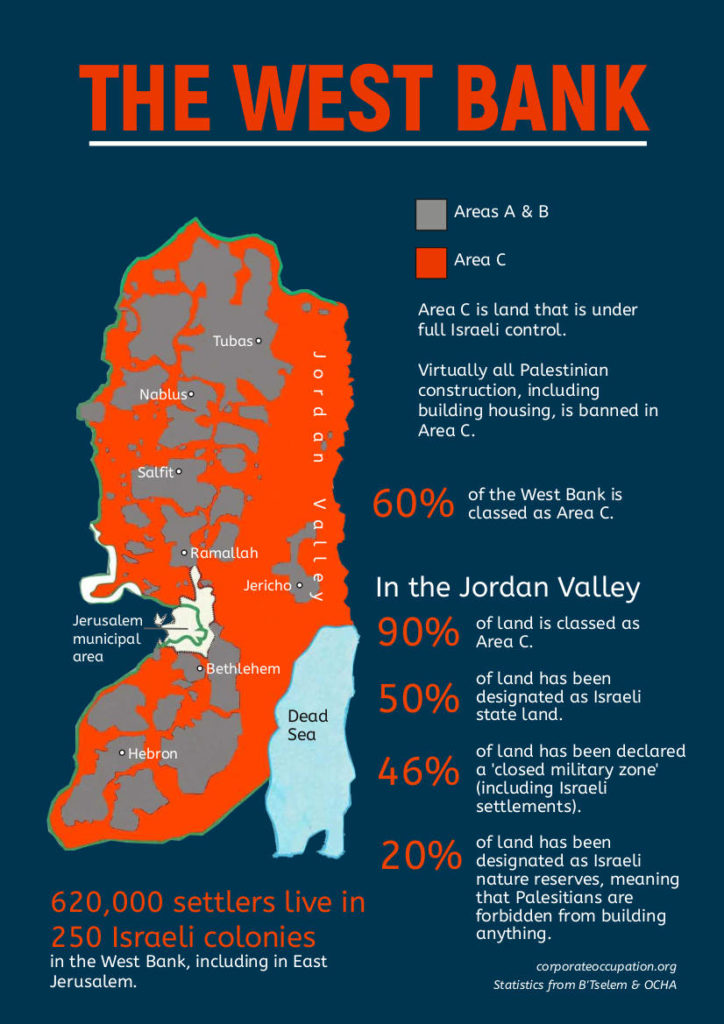
Apartheid in the Fields 2020 update
By Tom Anderson & Eliza Egret
With contributions from Amy Hall
Design, diagrams & maps by Eliza Egret
You can contact the authors at tom@shoalcollective.org and eliza@shoalcollective.org
First published in February 2020 by Corporate Occupation, part of Shoal Collective
Front cover photo: A date palm plantation in the Jordan Valley. Photo by Corporate Occupation
About the authors
This briefing is a Corporate Occupation project. Corporate Occupation was established in 2009.
Our aim is to track corporate complicity in Israeli colonisation, militarism and apartheid, and to provide information-for-action for grassroots activists to use in their campaigns.
Corporate Occupation is run by writers from Shoal Collective. Shoal is a radical, independent co-operative of writers and researchers. We produce news articles, investigations, analysis and theory-based writing as a contribution to, and a resource for, movements that are attempting to bring about social and political change.
Underpinning our writing is the desire to foster grassroots resistance to capitalism by exposing
• The social misery caused by economic exploitation
• The ecological destruction inflicted in the interest of making profit for the few
• The destruction caused by unending wars, fought to control people and the natural world.
We explore and promote progressive, democratic alternatives to the dominant current economic and social structures. We want to work with people on the frontline of struggles around the world and amplify their stories.
corporateoccupation.or @CorpOccupation @ShoalCollective
The ongoing ethnic cleansing of the Jordan Valley
The Jordan Valley is the breadbasket of the West Bank. Israeli settler companies are farming dates, peppers, herbs and other crops on an industrial scale. The majority of these products are shipped for export outside of Palestine/Israel.
The exploitation of the Jordan Valley by Israeli settler agricultural companies is not just a capitalist project. It is a colonialist one.
Our interviews during 2018 showed that more and more Palestinian land is being expropriated by the occupation authorities and made available to the settlers for industrial agriculture. Since the start of the occupation of the West Bank, there has been a constant creeping colonisation and ethnic cleansing of the Jordan Valley. The enforced alienation of Palestinian communities has happened through:
• The establishment and expansion of illegal settlements[1]
• The setting up of ‘national parks’,[2] where Palestinians are forbidden to live or farm
• The proliferation of military training areas and firing zones[3]
• The domination of the water supply by the Mekorot Israeli water company [4]
• The digging of settler wells that irrigate settlement agriculture but deplete Palestinian water supplies [5]
• The confiscation of Palestinian water tanks and animals in isolated rural communities [6]
All of these processes are being deliberately carried out by the Israeli state to benefit the settlers and marginalise Palestinian communities. Only 6% of the Jordan Valley is now under even limited Palestinian control,[7] while 46% of the Valley’s land is made up of closed military areas.[8]
Colonisation since 1967
Israel occupied the West Bank in 1967, expelling 325,000 Palestinians to neighbouring countries.[9] Military rule was established throughout the West Bank. Israeli colonists soon began to settle the new occupied area, hand in hand with the state. Many military bases were established throughout the Jordan Valley in 1967.[10] After 1968, some of these military bases were converted into permanent Israeli colonies,[11] and thus the colonisation of the Valley began.
Bedouin Palestinian communities living in the areas close to the Dead Sea were pushed out through violence and intimidation. Many of them were forced to settle in the refugee camps of Jericho, or travelled north to communities closer to the centre of the Jordan Valley.[12] Now the shores of the Dead Sea are devoid of Palestinian communities. Instead, the region is dominated by Israeli agricultural settlements, and by colonies established to make money from tourism.[13] There are now almost 50 Israeli colonies in the Jordan Valley, and nearly 13,000 Israeli settlers.[14] These colonists dominate the resources of the Valley, marginalising and exploiting its 65,000 Palestinian residents.[15]
The Oslo ‘Peace Process’
Fifteen years of military occupation paved the way for the first Palestinian Intifada, a mass uprising across all of historic Palestine. The Israeli state responded to this by initiating a sham peace process, hoping negotiations would defuse the situation. In 1993 the Oslo process began, eventually establishing the Palestinian Authority led by Yasser Arafat.
The stated goal of the Oslo process was to work toward the establishment of a Palestinian state. But in fact the negotiations served more underhand aims. First of all, under the cover of the negotiations, Israeli settlers were able to steal more Palestinian land than in any other previous decade.[16]
Secondly, the Oslo process established three zones of control in the Occupied Territories: Areas A, B and C. Area A was under supposed Palestinian control, Area B jointly controlled between the Palestinian Authority and the Occupation authorities, and Area C under full Israeli control.
These zones of control were agreed as interim measures, only to remain in place up until the creation of a Palestinian state. The promised Palestinian state, of course, never came into existence. But Areas A, B and C remained as a new system of repression.[17]
Over the 25 years since the establishment of these zones of control, the Israeli Occupation authorities have imposed a near-blanket ban on the building of Palestinian houses in Area C. Any Palestinian structures built after 1967 are subject to demolitions. Palestinian agricultural crops, water infrastructure and trees in Area C are routinely bulldozed by the military, or by workers from the Israeli Civil Administration.[18] 60% of the entire West Bank is classified as Area C.[19]
An even higher proportion of the Jordan Valley falls within Area C: almost 90%. This means that Palestinian communities cannot build anything to meet their needs,[20] and live under a constant existential threat.
A war on the Valley’s threatened communities
Many of the Valley’s Area C communities are under threat of annihilation by:
• The occupation authorities’ demolition policies[21]
• Settler harassment[22]
• The systematic denial of drinking water[23]
• The expansion of military firing areas[24]
Military training has been used several times as a guise for the forced removal of Palestinians from their homes.[25] Only with international pressure have they been allowed to return.[26]
According to Israeli human rights group B’Tselem: “From January 2013 through September 2017, the military compelled various communities throughout the Jordan Valley to vacate their homes 140 times.”[27]
One such community is Hammamat Al Maleh in the northern Jordan Valley. The residents of Al Maleh have been evicted several times so that Israeli military trainings can take place in the village.[28] The community is constantly subjected to home demolitions,[29] to settler violence fromthe residents of the nearby Israeli colony of Maskiyot, and to their village being reclassified as a’firing zone’.[30] The Israeli state wants to literally wipe communities like Al Maleh off the map.
In 2019, a new Israeli state project was uncovered by Palestinian campaign group Jordan Valley Solidarity. The plan is a new existential threat to 12 Palestinian villages in the Jordan Valley, as well as several hamlets. The government’s plan “aims to connect all 13 illegal colonies (Baka’ot,Givat Sa’alit, Hamdat, Maskiyot, Mekhola, Ro’i, Rotem, Shadmot, Mehola and a new colony currently under construction) by two existing roads – the N90 and the Alon Road (route 578) – to form one large, closed Israeli agricultural area.”[31]
The plan would effectively erase Palestinian existence in the northern Jordan Valley, to the benefit of the big settler farms.
Threat of annexation
Israeli politicians have long been threatening the annexation of the entire Jordan Valley. In 2013, right-wing politicians voted for a symbolic motion calling for an annexation of the Valley to thestate of Israel.[32] In September 2019, the plans for annexation were given Prime Ministerial approval in a press conference by Benjamin Netanyahu. Netanyahu pledged that if his government was re-elected to another term, then he would oversee the annexation of the Jordan Valley. He said:
“Today I’m announcing my intention, with the establishment of the next government, to apply Israeli sovereignty to the Jordan Valley and the northern Dead Sea.”[33]
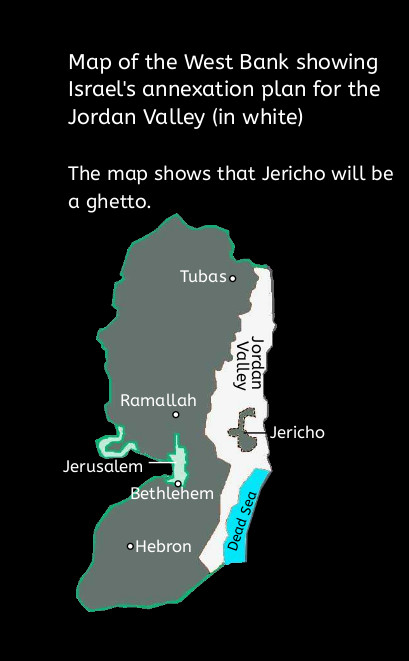
Stealing almost a quarter of the West Bank
Netanyahu’s scheme would reportedly annex 1,236,278 hectares of land to the Israeli state.[34] This would amount to between 22% and 30% of the West Bank. A map of the plan shows that it would create Palestinian ghettos, separated from the rest of the West Bank. The biggest of these ghettos would be the city of Jericho.[35]
“The vision presented by the Prime Minister is, in fact, a vision of apartheid”
Israeli anti-occupation group Peace Now has compared the policy to the ‘Bantustans’ established by South Africa’s apartheid regime:
“The vision presented by the Prime Minister is, in fact, a vision of apartheid, of one country in which one group of civilians has full rights (Israeli) and another (Palestinians) does not. The autonomy and access roads Netanyahu guarantees to the Palestinians in the Valley are alarmingly similar to the Bantustanformula in former Apartheid South Africa.”[36]
Preventing Palestinian autonomy
Several commentators have pointed out thatthe plan will be another nail in the coffin for a future Palestinian state, and for Palestinian hopes of autonomy in the region.
According to Peace Now:
“Anyone familiar with the conflict, the geography of the region, and the minimum conditions for establishing a Palestinian state in the Occupied Territories knows that an independent and viable Palestinian state cannot be established with such a large swath of land along the Jordan River taken away.”[37]
Netanyahu’s announcement comes one year after Israel’s attempts to demolish the Bedouin community of Khan al-Ahmar.[38] This attempted expulsion, which took place just west of the Jordan Valley, was widely seen as part of an attempt to make any future attempt to establish an independent Palestinian state impossible.[39]
Trump’s ‘deal of the century’
In late January 2020, Netanyahu travelled to the White House for meetings with US President Trump. Trump unveiled his ‘deal of the century’, which he said was intended as a plan for peace between the Israelis and Palestinians. Instead, the plan aims to give the green light to there drawing of Israel’s borders and the annexation of the Jordan Valley.[40]
Trump promised economic rewards of $50 billion to the Palestinian Authority as a pay-off for accepting the deal. But PA President Abbas has outright refused.[41]
Trump also hosted Benny Gantz of the ‘White and Blue Party’ at the White House. Gantz, Netanyahu’s chief electoral rival, is also strongly supportive of annexing the Valley.[42]
The Israeli state immediately began to make preparations to annex the Valley, keen to take full advantage of Trump’s support for the annexation. The Israeli military moved more troops to the Valley, in anticipation of Trump’s announcement.[43]
However, the US has requested that the annexation does not go ahead until after the March 2nd 2020 Israeli election.[44]
If the annexation does go ahead, it will be the largest Israeli land seizure since the Golan Heights was unilaterally incorporated into Israel.[45] Like the Golan Heights and East Jerusalem, the annexation will be in contravention of international law.
Our comrades in the Jordan Valley will need our solidarity in the months to come, as they face the consequences of these new US-Israeli annexation moves.
Steadfastness
“To remain in the Jordan Valley is truly an act of resistance”
Despite all this, Palestinians continue to resist. After Netanyahu’s annexation plans were announced in September 2019, Palestinians braved the bullets and teargas of the Israeli army to demonstrate close to the colony of Kalia on the Dead Sea coast. Demonstrators were brutally attacked and beaten by the army. A statement by the Popular Struggle Coordination Committee reads:
“We resist annexation by enacting Palestinian sovereignty over its borders, land and the water that flows above and beneath the surface, so that basic needs of our people are met and justice for our people as well as for the generations before and for those yet to come is realised.”[46]
The most consistent and steadfast resistance is from the residents of the Jordan Valley, from the people who live in communities like Al Maleh and Al Hadidya, and hundreds more like them who refuse to leave their homes in the face of constant Israeli army and settler harassment. They refuse to be intimidated despite their houses being bulldozed and their livelihoods taken away, and despite the fact that they are systematically denied even water to drink.
Demonstrations were held all over the West Bank and Gaza in response to Trump announcing his ‘deal of the century’. In the Jordan Valley, hundreds of Palestinian demonstrators entered an area which had been declared a ‘closed military zone’ and symbolically planted chickpeas.[47] At the same time, Israeli settlers demonstrated outside the Mehola colony with T-shirts emblazoned with the slogan ‘annexation now’.[48]
Jordan Valley Solidarity
Jordan Valley Solidarity (JVS) is a grassroots network which has been set up to support communities in the Valley. JVS sent us the following statement in response to the deal:
“The Trump deal announced is not a peace deal, but a war against the Palestinian people and their private property. This is the truth because the lands to be annexed are private lands for the Palestinians, and there are papers and evidence of ownership.
The area of these lands [earmarked for annexation] is 30% of the area of the West Bank and 60% of the Jordan Valley… [The planned area for annexation includes] water sources such as the Jordan River, the Dead Sea and groundwater [which contribute] heavily to our economy. In addition, the Jordan Valley is the only border we have with Arab countries. [Through this plan] Trump kills any hope that there is left for the peace process. It will be impossible for a Palestinian state to see the light if Trump and Netanyahu’s plan is implemented.”
One of Jordan Valley Solidarity’s most important projects is the rebuilding of homes, schools and community resources in defiance of the Occupation’s building restrictions. According to JVS:
“We are establishing the right of Palestinian communities to build their own infrastructure, andwe are creating the ‘facts on the ground’ that enable families to stay o n the land they’ve beenliving on for generations.
We are creating the conditions that make it possible for the Palestinian Authority, NGOs and international donors to provide support to these communities that are so vulnerable to brutal ethnic cleansing by the Israeli state.
We are planning for the future, to ensure that we still have a strong and healthy community in the Jordan Valley when Palestinians achieve their right to independence and selfdetermination.”[49]
The motto of the Jordan Valley Solidarity network is “to exist is to resist”. This phrase has never rung more true than now. The very existence of the majority of Palestinian communities in the Jordan Valley has been put into question by Benjamin Netanyahu and Donald Trump.
For most of the Valley’s residents, simply remaining in the communities that they were born into means that they are a direct obstacle to the Israeli state’s plans. In the coming months the Israeli state, backed by the US president, may try to steal the ground from beneath the feet of these communites. To remain is truly an act of resistance. International solidarity with the Palestinians of the Jordan Valley has never been more important than now.
Mislabelling: a systematic and deliberate attempt to mislead consumers
The Israeli companies profiled in this report are all engaging in the routine mislabelling of produce from the West Bank. The EU’s guidelines about the labelling of fresh produce are clear: that foodstuffs originating from Israel’s illegal settlements must be labelled as such.
Corporate Occupation’s researchers have been carrying out undercover research in the Jordan Valley settlements for over ten years. However, in all our trips to the Jordan Valley we have never seen one box of fresh produce being labelled to show that it originates from an Israeli settlement, or that it comes from the West Bank. Instead, fresh produce being packaged in the Jordan Valley settlements is routinely labelled ‘Produce of Israel’. Companies, as a matter of course, label produce with an address inside Israel’s 1948 borders.
Why do Israeli companies mislabel settlement goods as ‘Produce of Israel’?
Israeli export companies do not want consumers to know that the food they are buying is from a settlement as they are worried that it will stop consumers buying their products. In June 2000 the EU and Israel signed an Association agreement allowing beneficial terms for Israeli companies exporting goods to the EU.[1]
Israeli companies want to fraudulently claim the preferential terms of this agreement by portraying their products as produce of Israel when they actually come from Israel’s colonies. This is in direct contravention of the 2010 ruling of the European Court of Justice in the Brita case (see page 12).
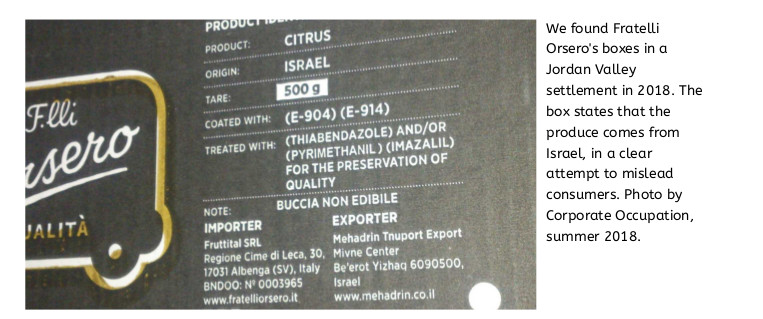
Examples of systematic mislabelling uncovered by Corporate Occupation’s research in 2018
• We found citrus fruit packaging in the colony of Argaman mislabelled ‘Origin: Israel’. The fruit was being marketed by Italian company Fratelli Orsero, and exported by Israeli company Mehadrin. A company address was listed in Be’erot Yitzhaq, within Israel’s 1948 borders.
• We photographed packaging for fresh herbs in the settlement of Argaman. The box waslabelled ‘Pays d’Origine Israel’
.• We saw Mehadrin dates labelled ‘Mehadrin: Growers of Israel’ in the settlement of Gilgal.
• We obtained packaging for bell peppers packaged by Hanan Pasternak in the settlement of Tomer. It was labelled ‘Produce of Israel’.
• We photographed a box of Arava fresh organic herbs in the settlement of Mehola. They were labelled ‘Country of origin, Israel’. The box was labelled with a company address in the city of Modi’in, inside Israel’s 1948 borders.
• We photographed piles of flatpacked packaging for Bless Herbs Ltd in a herb packing house in Mehola settlement. The boxes were labelled ‘Produce of Israel’ and bore a company address in Ness Ziona within Israel’s 1948 borders.
This is just a small sample of the mislabelling uncovered in this report. Corporate Occupation found identical evidence of mislabelling on our research trips in 2010 and 2013.[2]
This amounts to a systematic attempt to mislead consumers. Israeli export companies are also misleading European supermarkets and retailers about the provenance of their produce.
Take action
Contact your local supermarket’s head office & alert them to the evidence of systematic mislabelling of produce from the settlements. Point out that if they source from Mehadrin, Galilee, Hadiklaim, Arava, Mor, Miriam Shoham & the other companies listed in this report, then they cannot guarantee that the companies are being honest about the provenance of the produce. Demand that they stop sourcing from these companies.
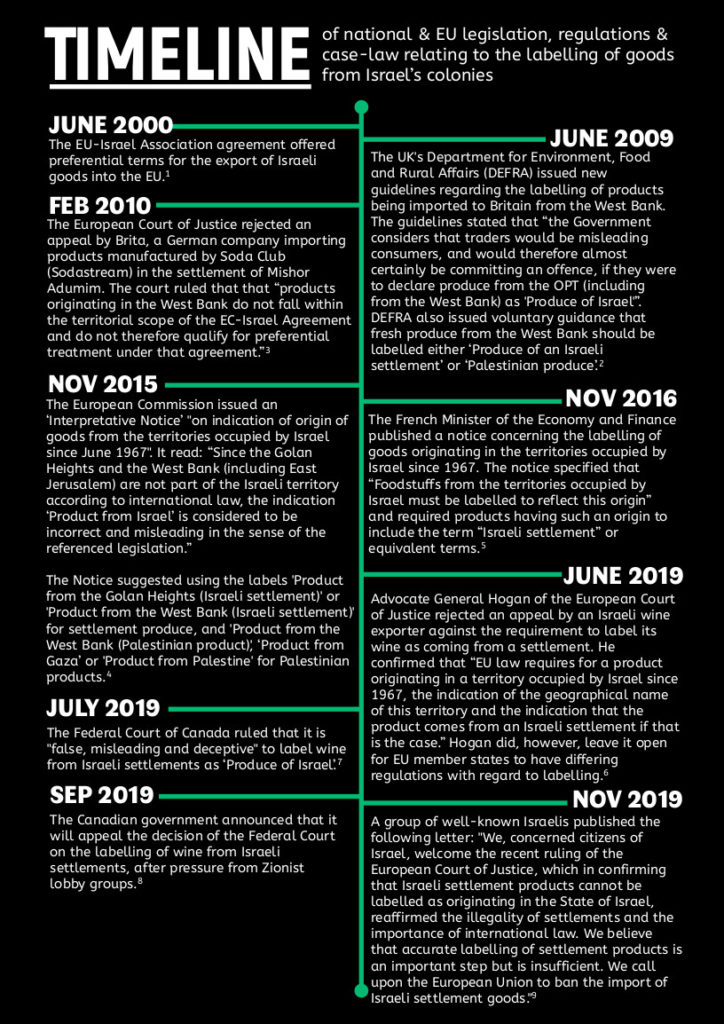
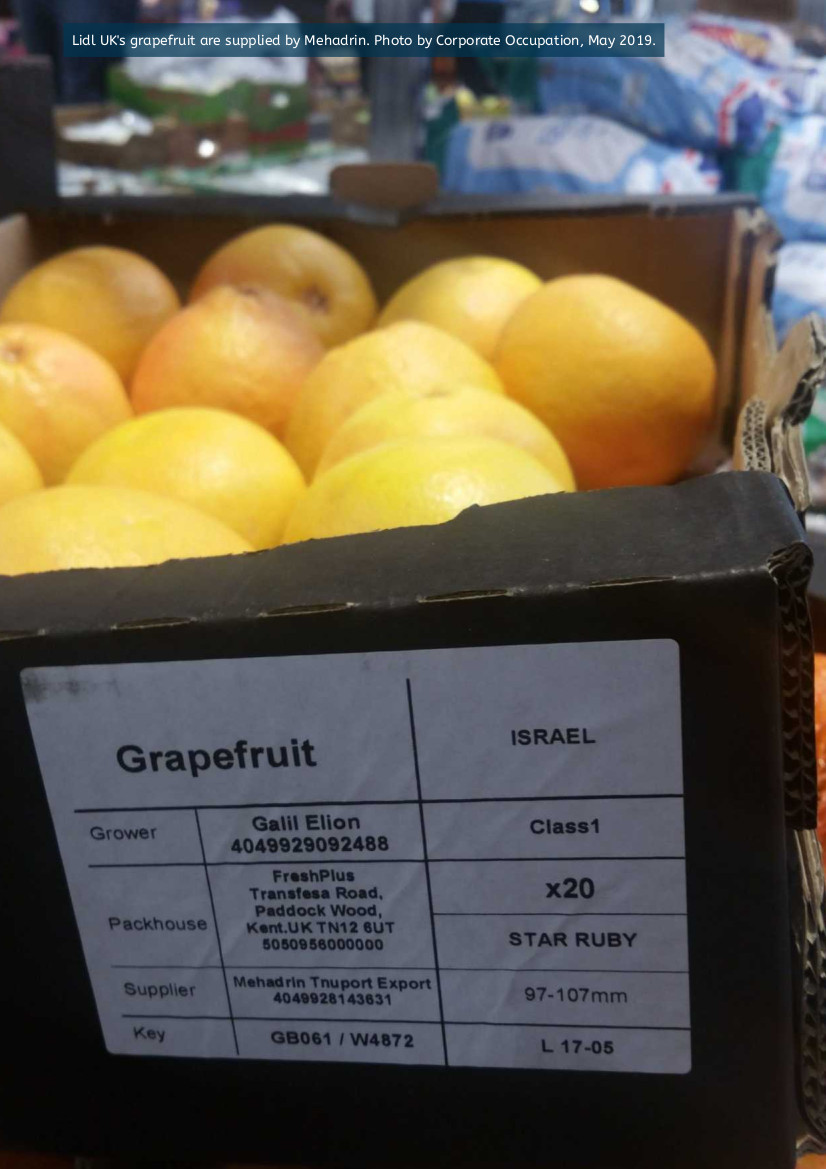
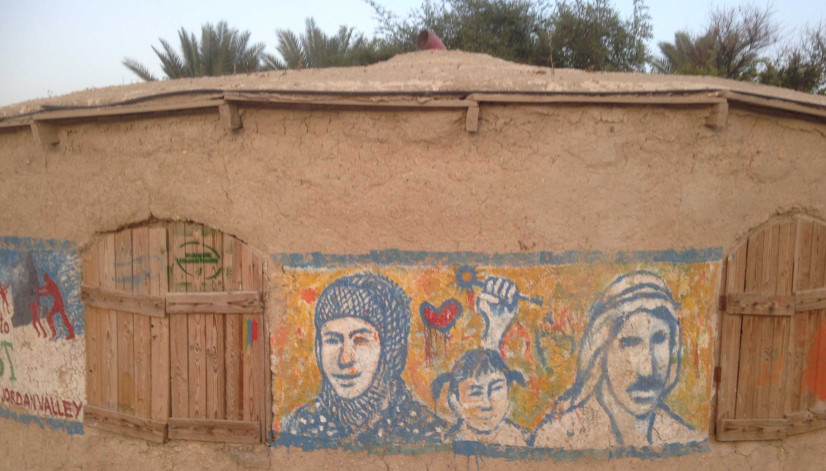

0 Comments